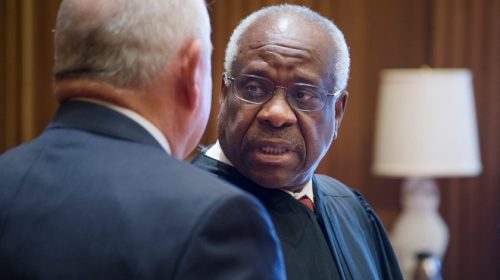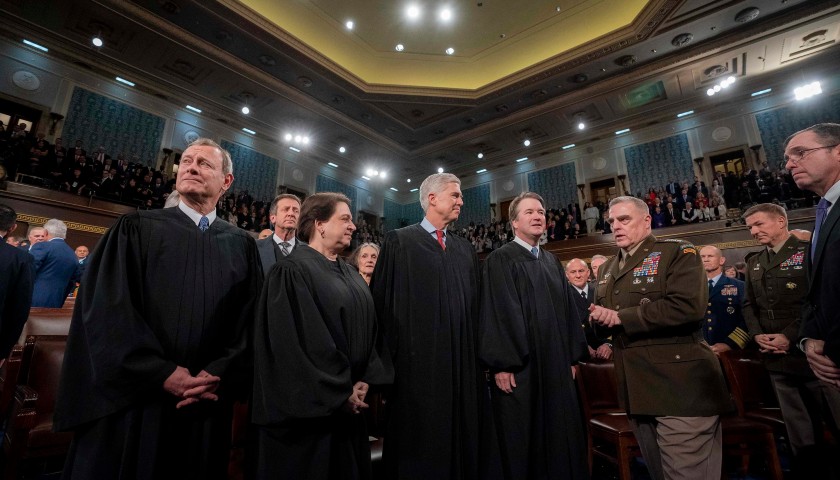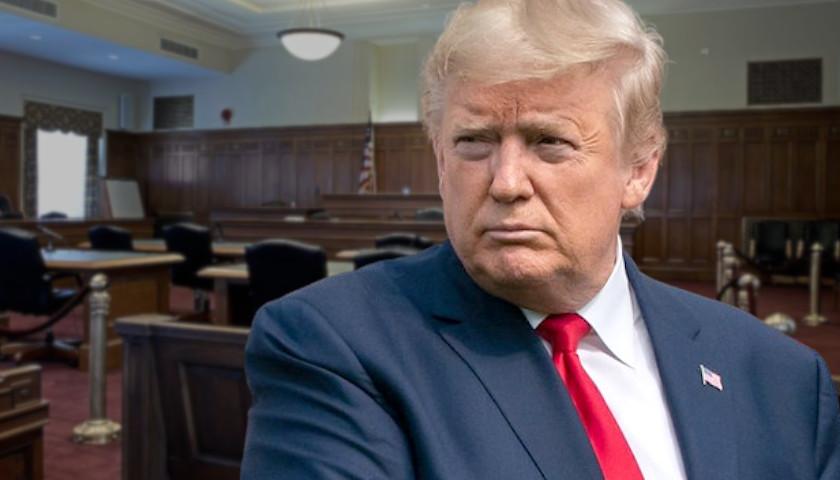by Debra Heine
The Supreme Court on Monday struck down a Republican challenge over absentee ballots received up to three days after Election Day in Pennsylvania.
Republicans in the Keystone State had sought to block a state court ruling that allowed the Nov. 6 deadline extension in the 2020 election.
The decision prompted dissents from three conservative justices; Justices Samuel Alito, Clarence Thomas, and Neil Gorsuch. The trio argued that while the legal questions in the case may not have affected the outcome of the November election, the Supreme Court should take the opportunity to clarify election law because the same legal issues could impact future elections.
Throughout his dissent, Thomas characterized the Court’s refusal to take cases challenging the election as “inexplicable,” “befuddling,” and “baffling.”
“These cases provide us with an ideal opportunity to address just what authority non-legislative officials have to set election rules, and to do so well before the next election cycle. The refusal to do so is inexplicable,” Thomas wrote.
 “The Constitution gives to each state legislature authority to determine the ‘Manner’ of federal elections,” Thomas argued. “Yet both before and after the 2020 election, non-legislative officials in various States took it upon themselves to set the rules instead.”
“The Constitution gives to each state legislature authority to determine the ‘Manner’ of federal elections,” Thomas argued. “Yet both before and after the 2020 election, non-legislative officials in various States took it upon themselves to set the rules instead.”
As a result, we received an unusually high number of petitions and emergency applications contesting those changes. The petitions here present a clear example. The Pennsylvania Legislature established an unambiguous deadline for receiving mail-in ballots: 8 p.m. on election day. Dissatisfied, the Pennsylvania Supreme Court extended that deadline by three days. The court also ordered officials to count ballots received by the new deadline even if there was no evidence—such as a postmark—that the ballots were mailed by election day. That decision to rewrite the rules seems to have affected too few ballots to change the outcome of any federal election. But that may not be the case in the future.
Thomas went on to stress that “the judicial system is not well suited to address these kinds of questions in the short time period available immediately after an election,” thus the Court should have used “available cases outside that truncated context to address these admittedly important questions.”
Here, we have the opportunity to do so almost two years before the next federal election cycle. Our refusal to do so by hearing these cases is befuddling. There is a clear split on an issue of such great importance that both sides previously asked us to grant certiorari. And there is no dispute that the claim is sufficiently meritorious to warrant review. By voting to grant emergency relief in October, four Justices made clear that they think petitioners are likely to prevail. Despite pressing for review in October, respondents now ask us not to grant certiorari because they think the cases are moot. That argument fails.
One wonders what this Court waits for. We failed to settle this dispute before the election, and thus provide clear rules. Now we again fail to provide clear rules for future elections. The decision to leave election law hidden beneath a shroud of doubt is baffling. By doing nothing, we invite further confusion and erosion of voter confidence. Our fellow citizens deserve better and expect more of us. I respectfully dissent.
In his dissent, which Justice Neil Gorsuch joined, Alito argued that the cases “present an important and recurring constitutional question: whether the Elections or Electors Clauses of the United States Constitution… are violated when a state court holds that a state constitutional provision overrides a state statute governing the manner in which a federal election is to be conducted. That question has divided the lower courts,* and our review at this time would be greatly beneficial.”
“Now, the election is over, and there is no reason for refusing to decide the important question that these cases pose,” Alito wrote. While a decision in these cases “would not have any implications regarding the 2020 election,” it would “provide invaluable guidance for future elections.”
Alito also rejected the argument that the decision only arose from the “extraordinary and unprecedented confluence of circumstances” of the COVID-19 pandemic and that “such a perfect storm is not likely to recur.” He wrote that the argument fails for three reasons. First, that it does not acknowledge the breadth of the Pennsylvania Supreme Court’s decision which used a constitutional provision guaranteeing “free and equal elections” to “override even very specific and unambiguous rules adopted by the legislature for the conduct of federal elections.”
Alito noted that “in order for a question to be capable of repetition, it is not necessary to predict that history will repeat itself at a very high level of specificity.”
Second, the suggestion that we are unlikely to see a recurrence of the exact circumstances we saw this fall misunderstands the applicable legal standard. In order for a question to be capable of repetition, it is not necessary to predict that history will repeat itself at a very high level of specificity. See Federal Election Comm’n v. Wisconsin Right to Life, Inc., 551 U. S. 449, 463 (2007).
Third, it is highly speculative to forecast that the Pennsylvania Supreme Court will not find that conditions at the time of a future federal election are materially similar to those last fall. The primary election for Pennsylvania congressional candidates is scheduled to occur in 15 months, and the rules for the conduct of elections should be established well in advance of the day of an election. We may hope that by next spring the pandemic will no longer affect daily life, but that is uncertain. In addition, the state court’s decision was not based solely on the pandemic but was also grounded in part on broader concerns about the operation of the Postal Service, App. to Pet. for Cert. 34a– 35a, 47a, and concerns of this nature may persist or resurface. As voting by mail becomes more common and more popular, the volume of mailed ballots may continue to increase and thus pose delivery problems similar to those anticipated in 2020.
“For these reasons, the cases now before us are not moot,” Alito concluded.
– – –
Debra Heine is a regular contributor to American Greatness.






Supremes to citizens, “let them eat cake”.
I find it inexcusable that the Supreme Court chooses to decide on election laws. They are going to a place that is clearly a state’s rights. The state courts have the final jurisdiction, the constitution has provided for them, the right to decide their local elections laws. Justice Thomas is trying to usurp their rights, the laws don’t apply the same in all states. Their is no overriding need for the federal court to inject themselves in this matter.
Roberts removal can be accomplished by (1. His resignation. or (2. Impeachment.
Resignation – – – not a chance
Impeachment – – – not a chance
So, we are stuck with this “political activist” indefinitely. Oh joy!
Liberals. That’s how it got hid
John Roberts is an evil progressive. And, we are stuck with him.
Obviously the buck no longer stops with SCOTUS. Many of their recent failures to hear cases is nothing more than abandoning their responsibility. And I put John Roberts at the top of the list.
By not hearing the case, it remains unresolved. Even though as noted in all three dissenting opinions, and not addressed in the majority opinion, the State Supreme Court of Pennsylvania DID violate the US and State Constitutions. Therefor the dissenting opinions are all that is needed to overturn the Pennsylvania Ruling, now and in the future. That the number of ballots illegally admitted into being counted, ALONE does not change the result, along with the remaining corrections to the counts DOES change several of the results. Though the race is fixed as of the state certification, all states continue to adjudicate objections and changes for months, sometimes over a year after election day. IL will not be complete until Late July or Early August. Several races have been changed, and the loser, though in office, is subject to recall and replacement if that district so decides.
A big change is the ouster of the speaker of the house after 50 corruption filled years in office. A prime example of absolute power corrupting absolutely & term limits. Over half the fraudulent elections activities identified & proven, would not have likely occurred with reasonable term limits.
I have to think John Roberts has something in his background he is being blackmailed with.
I agree Gordon